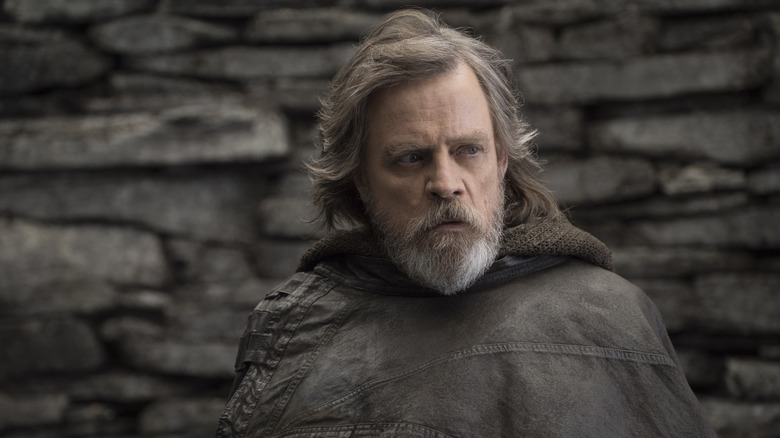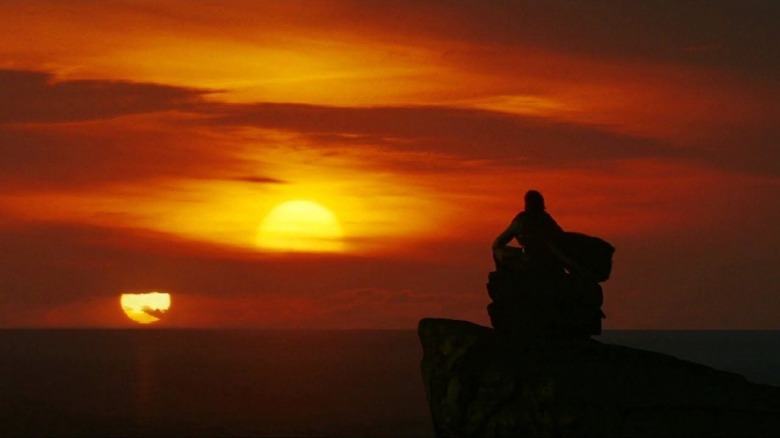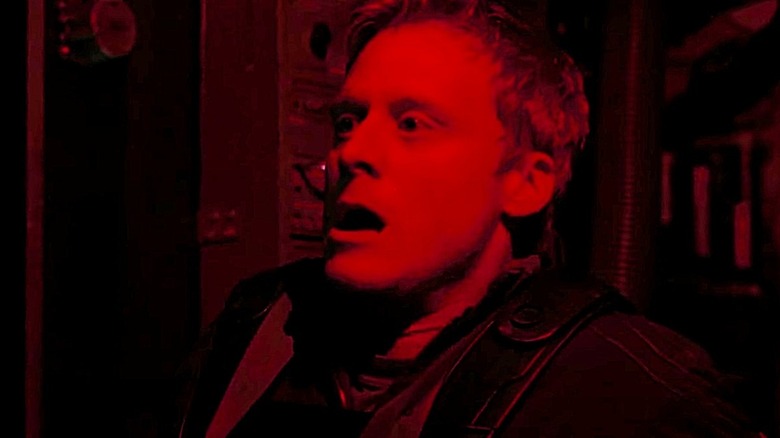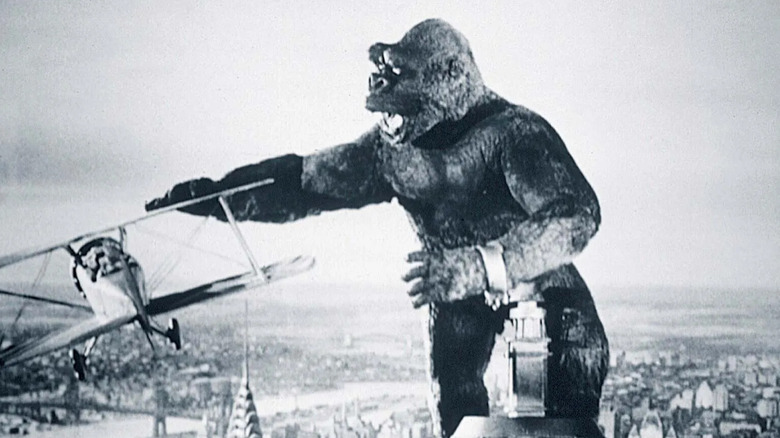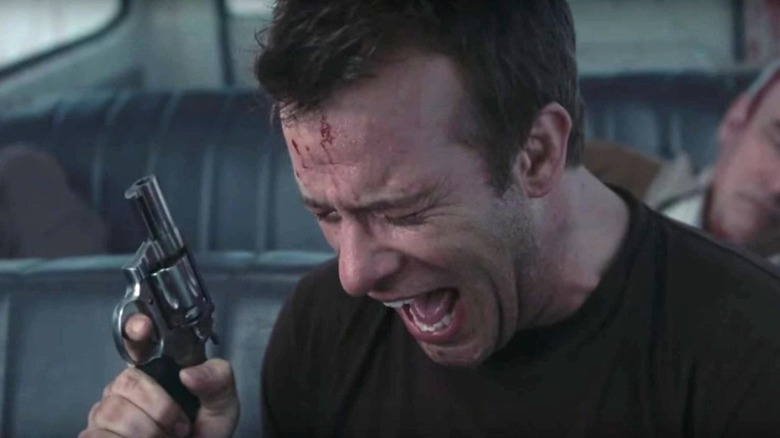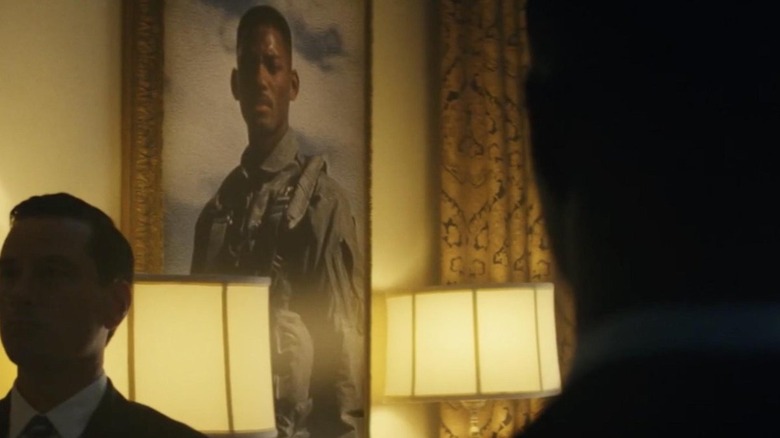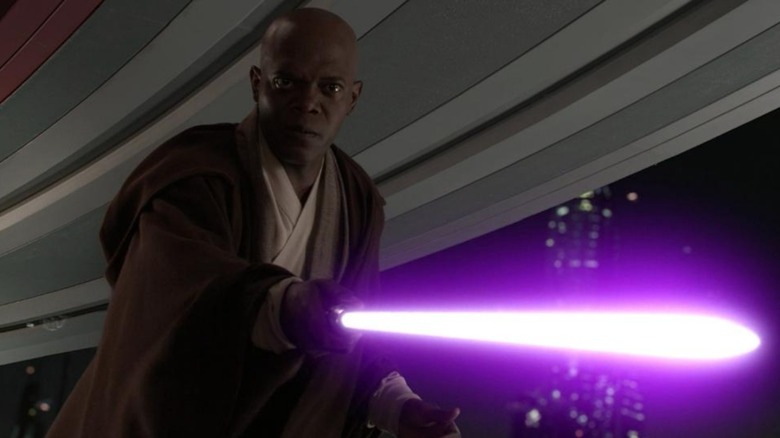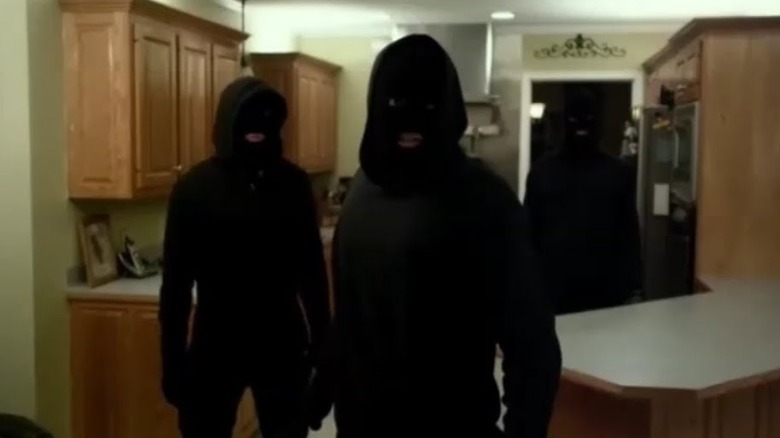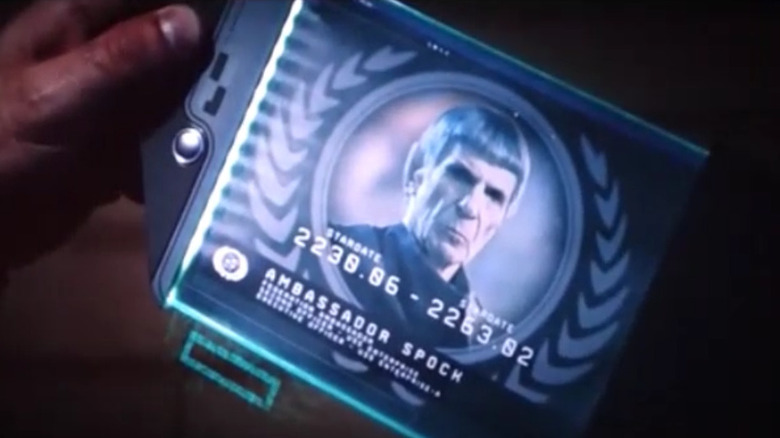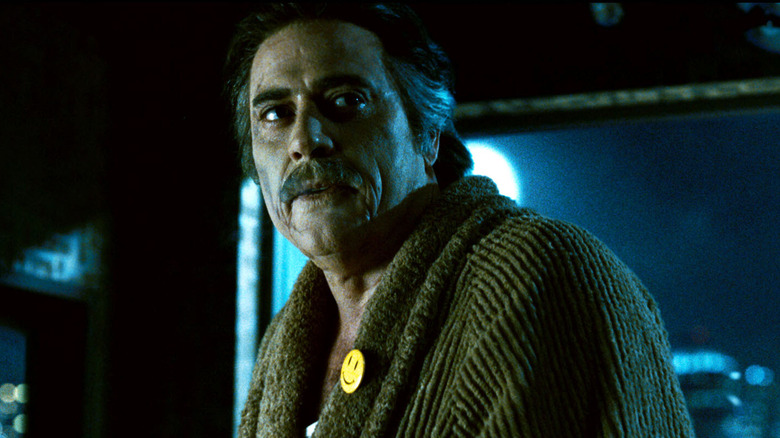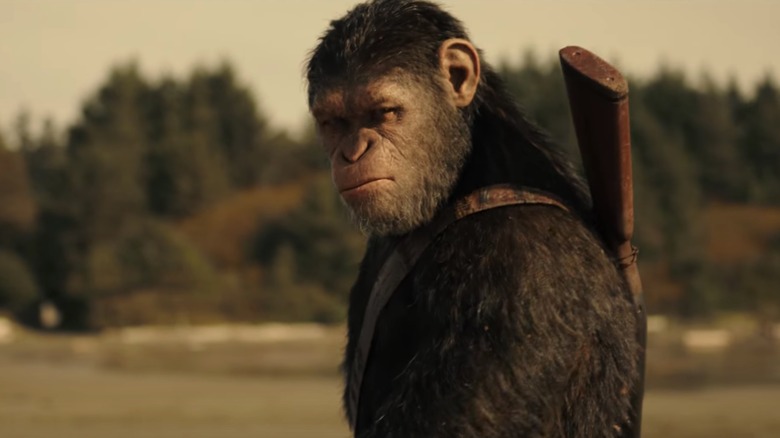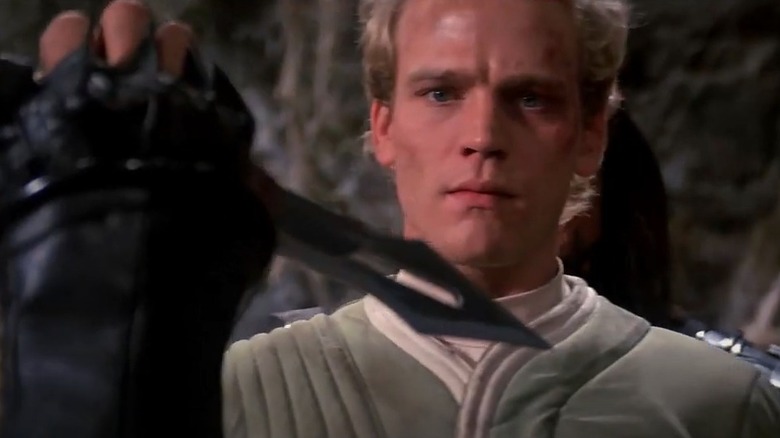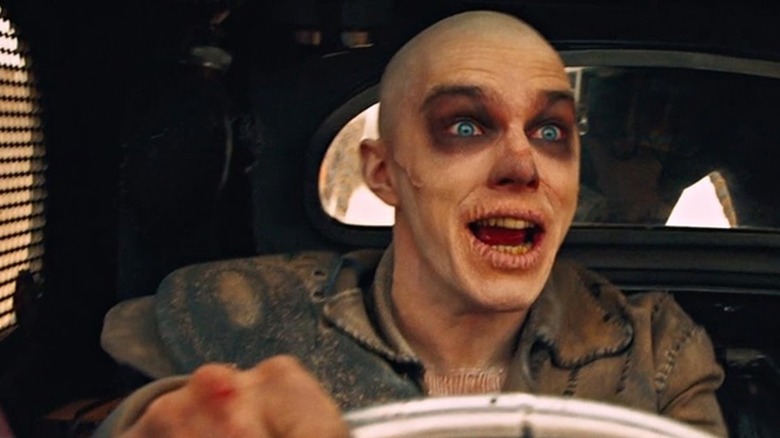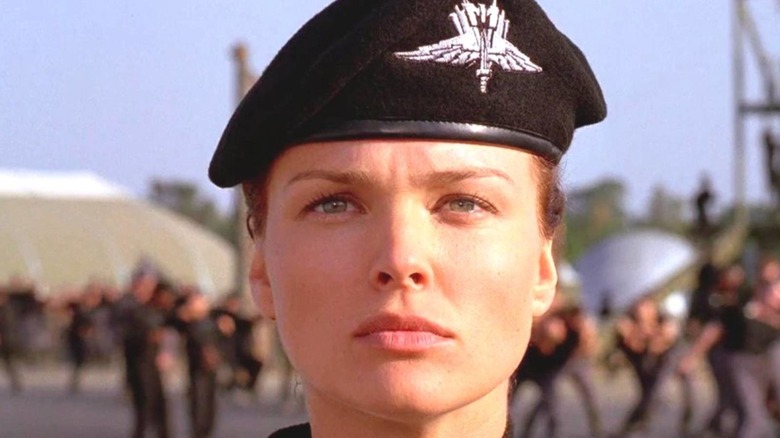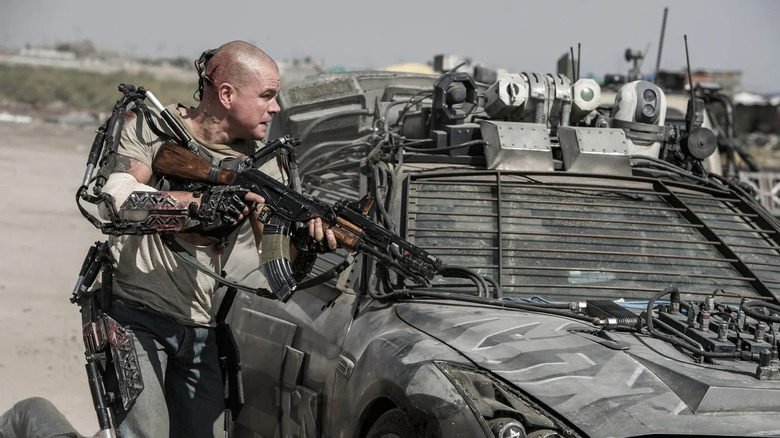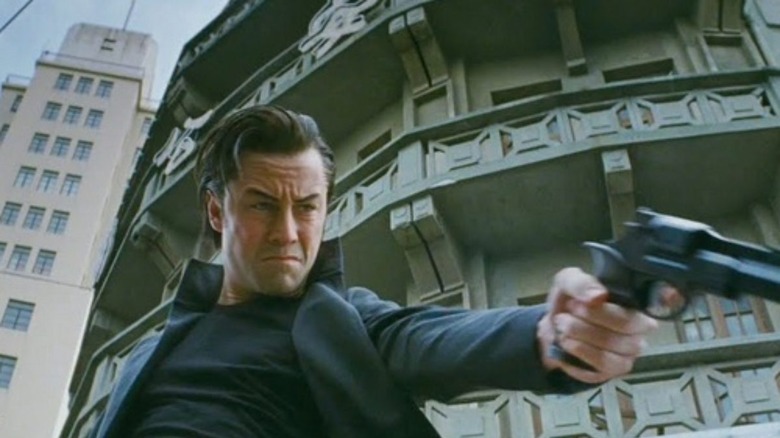Sci-Fi Movie Deaths We're Still Recovering From
Every sci-fi movie buff knows the importance of staying off of the Internet for as long as possible after a major film comes out. The last thing that fans want is to have a significant death spoiled for them. Spoilers for movies like "Star Wars: The Force Awakens," "Batman v. Superman: Dawn of Justice," or "Avengers: Endgame" were up on the Internet days before the films were released. It's always a good idea to stay off Twitter before a highly anticipated movie comes out. Of course, it's also just a good idea to stay off of Twitter in general!
Killing off a character is not a creative decision that science fiction filmmakers take lightly. Some major sci-fi movie deaths were either very controversial or completely ruined the rest of the film. Whether they were shocking, devastating, or disappointing, here are some science fiction movies with deaths that we're still recovering from.
Luke Skywalker, Star Wars: The Last Jedi
"Star Wars: The Force Awakens" shocked fans with the surprising death of Han Solo (Harrison Ford) at the hands of his son, Kylo Ren (Adam Driver). It was sad to see such a beloved icon of the original trilogy meet his demise in such a brutal fashion. Although Han's death was tragic, we're still processing how emotional Luke Skywalker's (Mark Hamill) demise was in "Star Wars: The Last Jedi." While Han's death was sad, Luke's death helped restore balance to the galaxy far, far away.
In the film's climactic ending, Luke duels with his nephew, Kylo Ren, and allows himself to be slashed by his lightsaber. This reveals that Luke isn't actually dueling at all. He's projecting his image to trick Kylo Ren. This allows Rey (Daisy Ridley) to bide her time and help Leia (Carrie Fisher), Poe Dameron (Oscar Isaac), Finn (John Boyega), and the rest of the Resistance escape. Although Luke doesn't perish in combat, the energy that it took to project his image drains the life force from him. He disappears into the netherworld of the Force in the same way that Obi-Wan Kenobi (Sir Alec Guinness) did in "Star Wars: Episode IV — A New Hope."
The symmetry of this scene is part of the reason that "The Last Jedi" is such a masterpiece. Luke has truly mastered all of the lessons that both Obi-Wan and Yoda (Frank Oz) taught him, including self-sacrifice.
Wash, Serenity
"Serenity" was the film that "Firefly" fans thought that they would never get. In just one season, "Firefly" proved to be the most exciting new science fiction television series since the original "Star Trek." However, "Firefly" never got to build the universe that "Star Trek" did. It was canceled after only one season. However, "Firefly" creator Joss Whedon returned to show the continuing adventures of Captain Malcolm Reynolds (Nathan Fillion) and his crew with "Serenity." "Serenity" features the returning cast, and does a great job at bringing the film to a satisfying conclusion.
Well, it was mostly satisfying. Before the final battle with the evil Alliance agent known as "The Operative" (Chiwetel Ejiofor), the pilot Wash (Alan Tudyk) is shockingly impaled and killed. It is a devastating moment, as Wash had been one of the most interesting characters in the series. It felt like his adventure was just beginning. While Wash's death is a tear-jerking moment, it doesn't work on a dramatic level. There's not really a reason for him to die other than to just gut punch the audience.
Kong, King Kong (1933)
Released in 1933, "King Kong" is one of the most important science fiction films of all time. It's amazing how well the film holds up, even after all of the new technological advancements in cinema that have been developed since. Some films from only a few years ago haven't aged well, but "King Kong" has stood the test of time. If you show a young viewer the film today, they will most likely still enjoy it.
"King Kong" is more than just a monster movie. It's a Shakespearean tragedy. Kong is a fully realized character whom the audience has sympathy for. Kong didn't ask to be taken from Skull Island and brought to New York City. There is no darkness within his monster heart. He is simply in love with Ann Darrow (Fay Ray). Kong perishes in a climactic battle and plunges to his death. "It was beauty killed the beast" is still one of the most devastating lines in film history.
Billy Drayton, The Mist
There are a lot of movies adapted from the works of Stephen King that contain shocking moments. Fans of King's work know that they should not learn to love any of his characters too much because they could die at any moment! Of all the disturbing death sequences in King adaptations, Frank Darabont's 2007 version of "The Mist" might be the most shocking.
After driving away from the mysterious creatures, David Drayton (Thomas Jane) faces an ultimatum. He knows that more monsters are on the way and that anyone unlucky enough to face one will meet a grisly death. David decides to do the unthinkable. He will kill the other passengers in the car to spare them from their fate. David struggles to work up the courage to kill his son, Billy (Nathan Gamble). However, in the moments that follow, David sees that soldiers have come to rescue everyone. If he had just waited a little bit longer, he and Billy could have escaped to safety.
"The Mist" is about as shocking as King gets, but it was all in a day's work for director Frank Darabont. Darabont also helmed the King adaptations "The Shawshank Redemption" and "The Green Mile," which both feature very emotional character deaths.
Captain Steve Hiller, Independence Day: Resurgence
Sometimes, actors that appear in one film in a franchise do not return for the sequels. This happens for a multitude of reasons, and it's usually disappointing for fans. However, there are ways to work around it. A character's fate can be explained without them having to appear on screen, or the role can be recast with a new actor. However, killing a beloved film hero off-screen is generally not a good idea.
Sadly, that's just one of the cinematic sins that Roland Emmerich committed with his 2016 film "Independence Day: Resurgence." Emmerich's original "Independence Day" was very successful because the audience fell in love with the great cast of characters, including Captain Steve Hiller (Will Smith). If "Independence Day" represented the best and most optimistic that summer blockbusters could be, then "Independence Day: Resurgence" is a combination of everything wrong with modern movies.
Hiller did not return in the sequel. Instead of treating the great character with respect, the film revealed that Hiller was killed in an off-screen accident. If that wasn't bad enough, the film also includes a shot of a giant portrait of Will Smith's face.
Mace Windu and his Jedi, Star Wars: Episode III — Revenge of the Sith
In general, the "Star Wars" prequel trilogy did not create new characters that were as beloved as the original heroes. The majority of the new characters were very bland. However, Mace Windu (Samuel L. Jackson) was a rare exception. Windu was simply a cool hero, especially since he was the only Jedi at the time to have a purple lightsaber. Jackson made the part his own.
In 2005's "Star Wars: Episode III — Revenge of the Sith," Windu leads several members of the Jedi Council to arrest Supreme Chancellor Palpatine (Ian McDiarmid). They have just learned from Anakin that Palpatine is actually Darth Sidious, the mysterious Sith Lord that they have been searching for. Windu and his Jedi ignite their lightsabers after they enter Palpatine's chambers, but he shocks them all by launching a surprise attack. Palpatine easily dispatches the other Jedi Masters before launching into a more exciting duel with Windu. It appears for a moment that Windu has gained the upper hand, but Anakin cuts him off (literally). Anakin's attack allows Palpatine to shock Windu with Force lightning and throw him to his death.
This is one of the most violent moments in the entire franchise. At the time, "Revenge of the Sith" was the only "Star Wars" movie to receive a PG-13 rating.
John's family, Universal Soldier: Day of Reckoning
Roland Emmerich's 1992 action film "Universal Soldier" is one of the cheesiest sci-fi disasters of the 1990s. Even for Emmerich defenders, there is little in "Universal Soldier" that is worth defending. However, the 2009 sequel, "Universal Soldier: Regeneration," took the franchise in a completely different direction. Under the pristine direction of John Hyams, "Regeneration" grounded the action in actual stakes and took the story to some very dark places.
Hyams topped his success with "Regeneration" with the next installment in the series, 2012's "Universal Soldier: Day of Reckoning." If you have any doubts that the "Universal Soldier" franchise is worth taking seriously, then just watch the opening sequence of "Day of Reckoning." Soldier John (Scott Adkins) witnesses the brutal massacre of his family at the hands of the former Universal Soldier, Luc Deveraux (Jean-Claude Van Damme). The entire sequence is shot from John's point of view.
Any sci-fi movie fan expecting a cheesy action movie like the first "Universal Soldier" probably needed some time to recover. Forget Emmerich entirely. "Day of Reckoning" feels like a film made by David Cronenberg, Brian De Palma, or David Lynch.
Ambassador Spock, Star Trek Beyond
There are some deaths in science fiction movies that are emotional for reasons beyond the films themselves. Spock (Leonard Nimoy) is one of the most beloved characters in the "Star Trek" franchise. 2009's "Star Trek" allowed Nimoy to return to the franchise through a clever storytelling device. The film takes place in an alternate universe known as "The Kelvin Timeline." In the Kelvin universe, the older Spock that fans knew from the original "Star Trek" series comes back to advise the new Spock (Zachary Quinto). Nimoy's version of the character is referred to as Ambassador Spock.
Ambassador Spock makes a cameo appearance in 2013's "Star Trek Into Darkness." However, before 2016's "Star Trek Beyond" hit theaters, Nimoy tragically died. In "Beyond," Ambassador Spock's fate is revealed. In a tear-jerking moment, Quinto's version of Spock reveals to Bones (Karl Urban) that his mentor has died. This was a great storytelling decision that helped "Star Trek" fans cope with the loss of their hero. To make things even more emotional, "Star Trek Beyond" is dedicated to Nimoy.
The Comedian, Watchmen
Although "Watchmen" is one of the greatest graphic novels of all time, the 2009 film adaptation that was directed by Zack Snyder does the source material justice. Snyder's stylistic impulses work. A dark, gritty, R-rated version of "Watchmen" makes a lot of sense! That approach, unfortunately, doesn't work quite as well when you apply it to characters like Superman.
Snyder's version of "Watchmen" is incredibly faithful to the graphic novel. Some of the most iconic panels are lifted directly from the original comic. Snyder's film opens with the same shocking moment as the graphic novel. The former Watchman known as The Comedian (Jeffrey Dean Morgan) is murdered by a mysterious assailant in his apartment. That initiates the ultimate question of "Watchmen" — "Who watches the Watchmen?"
This moment is very violent, but it's also more devastating on an emotional level. In the film's flashbacks, the audience learns to empathize with The Comedian and learn about his backstory.
Caesar, War for the Planet of the Apes
Anyone that complains that science fiction prequel films are pointless should just watch the modern "Planet of the Apes" trilogy which precedes the events of the original 1968 film. 2011's "Rise of the Planet of the Apes" explores how a virus known as "the cure" infects the ape population of Earth. An ape revolution is led by Caesar (Andy Serkis), who has been mistreated by humans for his entire life.
Caesar's journey as a hero and leader continues in 2014's "Dawn of the Planet of the Apes." However, Caesar faces his greatest opponent yet in 2017's "War for the Planet of the Apes." A remorseless military leader, simply known as "The Colonel" (Woody Harrelson), plans to massacre the entire ape population. After a gripping battle, Caesar frees the other apes and leads them on an exodus.
However, Caesar tragically dies after being shot. The moment is elegantly handled by director Matt Reeves. The incredible score by Michael Giacchino makes Caesar's death even more powerful.
David, Star Trek III: The Search for Spock
The death of Spock in 1982's "Star Trek II: The Wrath of Khan" is one of the most iconic moments in the entire "Star Trek" franchise. Spock sacrifices himself to save the crew of the USS Enterprise and his best friend, Captain James T. Kirk (William Shatner). However, like most beloved characters in science fiction, Spock did not stay dead for very long. The next film in the series, 1984's "Star Trek III: The Search for Spock," managed to find a way to bring him back to life.
In "Wrath of Khan," Kirk realizes that he has a son, David Marcus (Merritt Butrick). Marcus becomes an important scientist in the Federation in "The Search for Spock." However, David is shockingly killed off during the mission to rescue Spock. It comes as a surprise as Kirk was finally learning to respect David as his own man. While Shatner's acting abilities are worthy of criticism in some instances, his delivery of the line "Klingon bastard, you killed my son!" is devastating.
Nux, Mad Max: Fury Road
There are enough gruesome dismemberments in 2015's "Mad Max: Fury Road" to generate an entire list, and we certainly won't be forgetting the violent death of the cruel warlord Immortan Joe (Hugh Keays-Byrne) anytime soon. The fourth film in the "Mad Max" franchise boasts a spectacle unlike anything that fans of the original "Mad Max" trilogy had ever seen. Director George Miller also introduces some interesting social commentary. The film addresses themes of female empowerment, radicalization, and god complexes.
Nux (Nicholas Hoult) is a tragic character. He is a War Boy who was raised from a young age to serve Immortan Joe without question. After Nux decides to aid Max (Tom Hardy) and Furiosa (Charlize Theron) in their mission, he begins his redemption. Nux can't be blamed for the environment he was raised in. Nux's self-sacrifice to save the women that Immortan Joe brutalized is one of the most powerful moments in the film.
Dizzy Flores, Starship Troopers
If you were expecting Paul Verhoeven's 1997 film, "Starship Troopers," to be a cheesy, crowd pleasing sci-fi spectacle like "Independence Day," you may have been disappointed. Verhoeven's film is a warning about the evils of fascism, propaganda, and militarization. One of the brilliant storytelling choices Verhoeven makes is centering the story on a painfully generic love triangle that seems lifted straight out of "Beverly Hills: 90210." By making his characters shallow and generic, Verhoeven was able to show their ignorance of the propaganda that they are being fed.
Johnny Rico (Casper Van Dien) longs to reunite with his childhood crush, Carmen Ibanez (Denise Richards). He essentially ignores the flirtations of his fellow soldier, Dizzy Flores (Dina Meyer), even though they are a much better match. Dizzy is an experienced, brave soldier. It's only after Dizzy sacrifices herself in battle that Johnny realizes that he was really in love with her.
Max Da Costa, Elysium
Neill Blomkamp's 2013 dystopian action thriller, "Elysium," is a much better film than most people (including Blomkamp himself) give it credit for. It's hard to fault the ambition of "Elysium." While the social satire about the wealth disparity and the healthcare crisis is perhaps a little too overt, "Elysium" delivers as a satisfying action spectacle. It's not just the great set pieces that make the film entertaining. Blomkamp constructs an elegant character arc for its central protagonist, Max Da Costa (Matt Damon).
Initially, Max's motivations are completely selfish. After getting accidentally exposed to lethal radiation while he is working his day job, Max decides to pull off a heist on the space station known as Elysium. The Elysium orbital space station features advanced medical technology that is only available to the wealthy. During Max's break-in, he sacrifices himself to share the resources of Elysium with the suffering back on Earth.
Joe, Looper
Rian Johnson's 2012 film, "Looper," features one of the most inventive time-travel stories in years. In the universe of "Looper," futuristic technology in the year 2074 has made it impossible for murderers to cover up their crimes. A Kansas City gang decides to use specialized assassins called "loopers" to kill people that are sent back in time to 2044. Joe (Joseph Gordon-Levitt), a looper, is assigned to kill his future self (Bruce Willis), but the older man escapes.
The older Joe is on a path of revenge to kill a mysterious crime lord known as "The Rainmaker," who is responsible for killing his wife (Summer Qing) in the future. In 2044, "The Rainmaker" is just a child named Cid (Pierce Gagnon). The younger Joe realizes that he can prevent Cid from becoming the Rainmaker. He decides to kill himself before the older Joe can kill Cid. Once you wrap your head around the way the timelines sync up, it's a powerful way to end the story.
